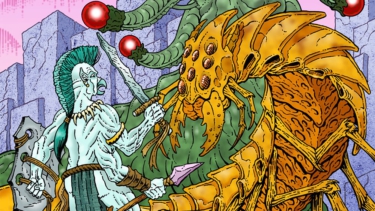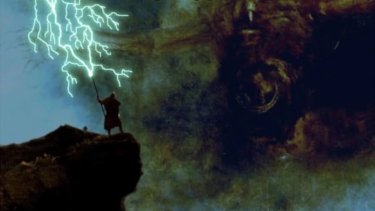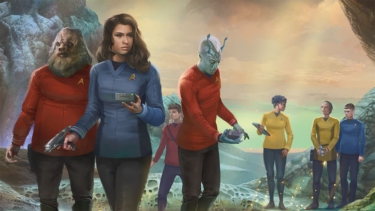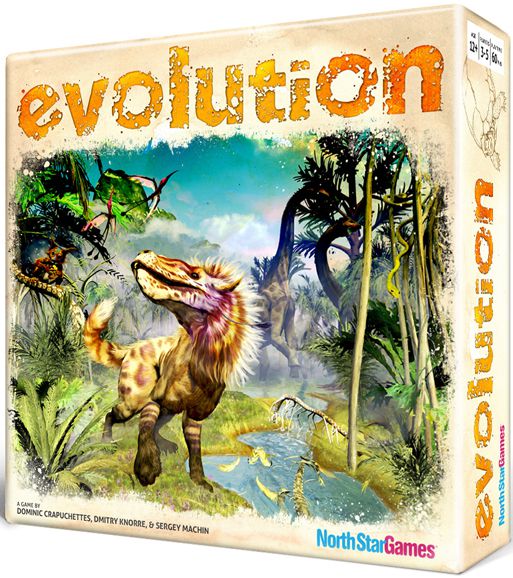
Each player begins with a single species card (which mainly tracks the size and population of those animals), a Food Bag where the tokens for the food your species have eaten will be placed, and a hand four Trait cards.
Evolution is played in a series of rounds, which are then broken into four rounds:
Deal Cards – Simply enough each player receives three Trait cards as well as an extra card for each species they control. You aren’t saddled with only one species throughout the game as you’ll bring new species to the table while others will go extinct.
Place Food – The Trait cards not only indicate a unique aspect of a species but also holds a number in the lower corner which can be used to fill the community food source, known as the Watering Hole. During this phase everyone chooses a single card from their hand and places it, face down, on the Watering Hole. These cards will be revealed later to determine how much Food will be available this round.
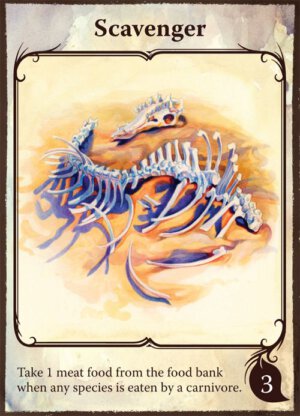
Species may each have up to three Traits (Traits can’t be duplicated within a species) and these can run the gamut from increasing the defensive ability of the animal, make the species more dangerous to prey, providing bonuses for feeding the animal, or even making the species carnivores; species are initially omnivorous.
While your species begin as rather tiny, sparsely populated creatures you can play a card to increase either their size or population of the species a single point up through the maximum seven. Larger animals are more difficult for carnivores to prey upon, or more powerful if the animal happens to be a Carnivore, and Population not only comes into play with end game scoring but also protects your species if another player decides they want to target that animal as an all you can eat buffet.
Finally, a Trait card can be played to create a brand new species to add to your stable of creatures. Players will want to have a number of species on the table not only for scoring but because you’ll need something to do with those Trait cards you receive each round. Plus, you’ll find you may need to use your own animals as a food source for your carnivores from time to time.
Feeding – Eating is the name of the game since without food your species will not survive. The face down Trait cards on the Watering Hole are revealed, and the numbers tallied, so that amount of Food tokens can be taken from the Food Bank and placed on the Watering Hole. In order, each player will receive a single Food token from the Watering Hole and then use their species Traits (Foraging as an example) to increase the amount of Food drawn. If the Food from the Watering Hole runs out the player will have to look to other options to feed their species; carnivores will never eat Food from the Watering Hole, as those are plants, and these are meat eaters. Carnivores will need to attack other species – including the players own species – in order to survive.
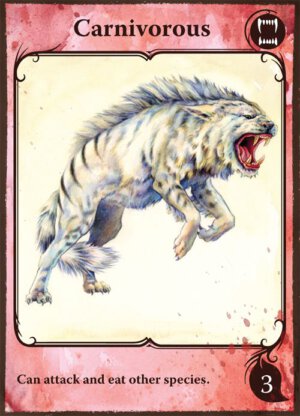
Evolution continues until the Trait deck runs out (or the discard pile needs to be reshuffled to provide a final round of cards being dealt) which then brings about one final round of play. Players will score a single point for each Food token in their Food Bag, a point for each Trait card on their species, and then points equal to the populations of their species. The highest score marks the winner with a few tie breakers coming into play if two or more players finish with the same total.
I have to say I was intrigued when I learned Northstar was aiming to release their first strategy title. Granted, some of the company’s current offerings might not be my exact cup of tea (i.e. Crappy Birthday… Although it’s no fault of Northstar’s since it’s pretty public knowledge I’m not much of a party game sort of gamer) but they certainly have a notable track record of producing good games in the family/party genre. Part of what piqued my interest was seeing what Northstar would send my way since more times than not when a company branches out from their established niche the results tend to be rather lackluster at best.
At first glance I wasn’t sure what to make of Evolution. Looking at the prototype, as well as reading through the rules, led me to believe there wasn’t going to be much meat to the gameplay as things appeared a touch too programed, and obvious, as far as simple paths to victory.
Happily I can report my initial impressions were off base as playing Evolution revealed plenty of interesting angles to the design which weren’t readily apparent until the game hit the table for repeated play. While taking a straight forward approach to tackling Evolution (by focusing on your own species Traits and Populations) will allow someone to be competitive, a clever player who keeps a keen eye on ALL the species on the table can make life mighty difficult for their opponents. Knowing half the battle is keeping your animals fed, while doing what you can to starve competing species out of existence, can go a long way to sealing a victory.
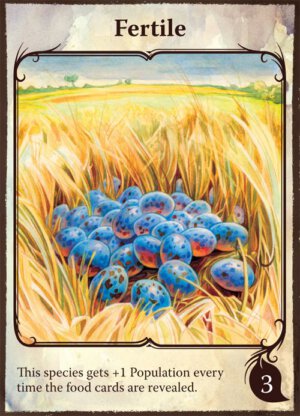
It’s important to note Evolution is driven by Trait cards so there is a good deal of luck involved; getting a few hands of Trait cards in a row, which don’t fit your game plan, won’t necessarily cripple you but could make for some tough slogging. Kumbaya gamers will want to know there’s a bit of “take that” involved since carnivores will have to prey on other species in order to survive and you’re surely more apt to attack opponents species than your own but, hey, a creature has to eat!
Gamers looking for a nice way to introduce their friends to the strategy genre, or possibly themselves giving the genre a try, or keeping an eye out for a good lighter strategy title (which won’t take most of the evening to play) should give pledging support for the Evolution Kickstarter some serious consideration. Northstar Games has put together a solid first effort – as far as branching out and away from their bread and butter line of party titles – which most players who dig some challenging game play should enjoy.







